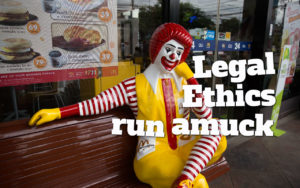In the world of strange litigation, the legal profession seems to have an affinity to McDonald’s. In this latest case, the profession might possibly be striking a new low. Legal ethics seems to be run amuck here with the crazy approaches that some lawyers take.
 As most of us by now realize, fast food restaurants have drive-thru windows. This is hardly a unique scientific discovery. In fact, I would surmise pretty much every fast food restaurant has a drive-thru window except for those where you park the car and someone on roller skates rolls up to you.
As most of us by now realize, fast food restaurants have drive-thru windows. This is hardly a unique scientific discovery. In fact, I would surmise pretty much every fast food restaurant has a drive-thru window except for those where you park the car and someone on roller skates rolls up to you.
I suppose, some folks ride up to the windows on golf carts, donkey carts or mopeds, but by and large, it’s the customer in the truck, SUV or sedan that barks out an order, pays and then gets something in return. Suppose a customer in on foot? Generally speaking, the customer finds a door, opens it and walks up to a counter. Has a customer ever walked up to a drive-thru window? I would suppose, but it’s not very safe and not very practical. The drive-thru window made to handle pedestrian traffic.
The Scott Magee Story
Scott Magee (Fox News, June 1, 2016) in blind. That is correct. He wants to use the drive-thru window to place an order. I will let that sink in for a minute. From a legal ethics perspective you know that some lawyers are beginning to see opportunity.
Scott obviously can’t drive. However he is undeterred. He claims that since he cannot walk up to the drive-thru window and use it to place an order, that it is a violation of the Americans with Disabilities Act. Oh my… legal ethics be damned – here’s an opportunity.
To quote from the article:
“Roberto Luis Costales, of New Orleans-based law firm Beaumont Costales, is representing Magee. He says McDonald’s current drive-thru policy is ‘discrimination in its purest form.’
McDonald’s is effectively prohibiting not just the blind, but millions of disabled Americans who cannot drive from using a service that is available to all other customers.”
To be fair, some McDonald’s operate only as drive-thru’s during night-time hours. However, Magee’s lawyer is going after bigger fish, he wants to have a special window in place for people with most any disability. The lawyer states:
“They could create an after-hours walk up service window, for example. This could generate more business for franchises and they are constantly changing the architecture of their business anyway.”
The lawyer seems to feel that these would be small changes that would not be expensive to implement. The lawyer has also suggested on-line pre-ordering. Both options, either the walk-up service window or online ordering would indeed be very expensive to implement. From a legal ethics perspective – what do you think? Is Costales truly interested in the disabled or looking for a settlement for such a foolish lawsuit?
What is lacking here is common sense. ADA accommodations have become astronomical in cost. While we are sympathetic to those with disabilities has it been determined just what percentage of McDonald’s customers would be “harmed” if no accommodation were made? There is a logic to construction of sidewalks to accommodate the blind, but what about private businesses being mandated to accommodate the blind?
There are about 1.3 million people who are legally blind in the U.S., within a total population of about 323.5 million, or 0.004%. Come on from a legal ethics perspective how many blind individuals would even think about wanting to visit a drive thru?
Obviously not everyone who is blind wants a McDonald’s! It may theoretically be that every McDonald’s in America could be forced to modify in some way to potentially accommodate less than 0.001% of possible customers. Where does it stop?
Let’s extend this scenario even further. Suppose one early morning Mr. Magee feels like a fried chicken sandwich and he can’t use the Popeye’s drive-thru. Does he then sue all of the Popeye’s? What about Starbucks or Arby’s? What about dry cleaner’s with such windows? Where does it stop? This is a prime example where there is no application of legal ethics.
Common Sense
There are many common sense solutions to Mr. Magee’s dilemma. For example, one fine day he could walk over to the McDonald’s and ask to see the manager. He explains his dilemma and asks if on a given morning, say at 2 a.m., if he feels like a shake that he can knock on the door with his white cane, pay for said item and they can hand him said item. Another solution is that a friend might be willing to drive him over to the window. There are also many pick-up and delivery services that would bring the fast food to his home. I tend to feel that in such situations most people are decent and ethical. A little local publicity might yield big results, such as people about to go through the window picking up an item for him. Yes, I am still the naïve!
While I clearly empathize with Mr. Magee’s problem, I also think that good old fashioned decency can prevail over litigation. That, too me is the proper application of legal ethics. Of course, Mr. Magee’s lawyer might lose a huge payday if that were the case.
YOUR COMMENTS ARE WELCOME!



The only problem here is the idiot judge who denied McDonald’s motion to dismiss and is permitting this legal farce to go forward as a class action.